 Extra-Sensory
Deceptions?
Extra-Sensory
Deceptions?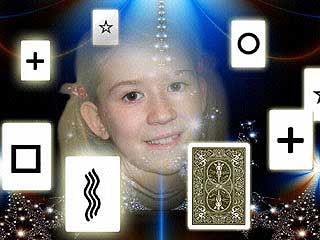
 Extra-Sensory
Deceptions?
Extra-Sensory
Deceptions?
Are there some people ("sensitives" or "psychics") who can somehow receive the thoughts of others, and even transmit their own thoughts to others? This direct mind-to-mind communication is often said to be instantaneous and independent of distance. Proponents sometimes claim all people have this ability to some degree, and that this explains many curious events in daily life, such as dreams of future events. The catch-all term for this alleged ability is extra-sensory perception, ESP. "Parapsychology" is the term used for what is purported to be a serious study of such claims. So far, however, parapsychology seems to be a "science" that cannot even demonstrate that its subject of study exists to be studied!
The claims for supernatural human abilities fall into four general categories:
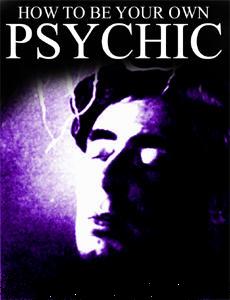 |
 |
The evidence cited for ESP is almost invariably anecdotal. "Uncle Charlie had a dream about Aunt Mabel falling into a hole, and sure enough, the next month she fell down some steps and broke her tailbone!" Sometimes it is claimed, however, that scientific tests at respected research institutions somewhere have conclusively demonstrated that ESP exists; or government tests somewhere have "proved" it; or, that the CIA or some secret agency "uses" it; or, that the Russians or Japanese or Chinese or somebody are "working hard" on it, etc., etc. Sometimes proponents cite even specific experiments as having confirmed the existence of ESP.
In fact, it is the essentially unanimous opinion of psychologists that the existence of ESP has not been shown. All procedurally valid and reproducible experiments have failed to demonstrate the existence of ESP. (See Hyman, Hansel, Alcock, Marks and Kammann, Polidoro, and Druckman and Swets for detailed reviews of the best-known experiments; see the reference list at the bottom of this page.) Let's consider why the existence of ESP is such an extraordinary claim, given the current state of our knowlege about the world we live in.Questions can be raised about every aspect of ESP. The existence of ESP ability in humans (or animals, for that matter) would not be consistent with anything we know about nature— either from the standpoint of physics or of human physiology. Let's consider the physiological aspects first. All the higher animals show the same fundamental organization of their sensory systems. The specialized cells (neurons) that form the central nervous system of man and other higher animals are themselves insensitive to sensory stimuli. For each kind of important stimulus in the environment, animals have evolved highly specialized sensory organs. Each such sense organ contains unique, highly adapted cells that are sometimes called "transducers". Each stimulus in the environment involves a special kind of cellular activity. Vision involves direct detection of particles of light (photons). Hearing involves direct detection of pressure-wave motion of air molecules. Smell and taste involve direct detection of molecular shapes. Sensory organs (eyes, ears, nose) support the cells specialized to detect photons, molecular motion, and molecular shapes directly. These cells generate impulses that travel along nerve fibers and which are then processed in intermediate switching and coding areas, finally reaching the brain in a form that the brain can interpret.
The brain itself is insensitive to sensory information. If one opened a skull and exposed the living brain to light, sound, heat, smells, even touch, etc., the brain would be totally unaware of the application of these stimuli directly to its tissues. For obvious reasons, the sensory organs containing the transducers cells are located at or near the surface of the body in all animals, including humans. When we apply this universal rule of nature about informational input into the brain to claims for telepathy, we come up short on all accounts. Assume that a person's brain radiates some kind of "something" as he or she thinks. How would another person's brain ever know about it? Nowhere on the surface of the body is there a specialized organ that appears to lack a function, and which contains transducer cells sensitive to "unknown forces". Nor, contrary to popular myth, is there any large area of the brain whose function is unknown, and which might be responsible for reception and interpretation of signals from the hypothetical ESP organ.
Furthermore, in the course of evolution many kinds of animals have developed extremely acute senses of one kind or another, as compared to those of humans. Dogs have much more highly developed sense of smell than we do; hawks and eagles, more acute eyesight; bats, much wider range of hearing, etc. Where is the animal that has a much more highly developed ESP sense than humans? The ability to sense the presence of predatory animals that could not have been seen, heard, or smelled would confer such enormous advantages for its possessors that evolution should have made ESP as common (and obvious) as fur, claws, and moist noses. It has not happened. Could it be that no such sense organ exists because there is no stimulus for the organ to detect?
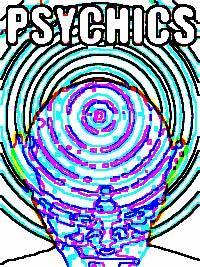 |
Some persons argue that only human beings are capable of ESP communication; or, that only certain, special persons are so endowed. Comparative anatomy fails to show any evidence for the former contention. And special people, upon examination, turn out to be invariably very ordinary... only their unsupported claims are special. |
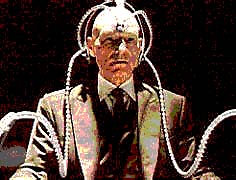 |
A proponent of ESP could argue that telepathy differs from all other senses in that the brain itself is somehow the telepathic sense organ. In this case the detected stimulus would require the penetrating power of X-rays or nuclear radioactivity in order to get through the skull to reach the brain! This brings us to the realm of physics, where ESP falls down as badly as in the realm of physiology.
Physicists have found, in 400 years of searching,
only four fundamental forces in nature: gravity, the
electromagnetic force, and the strong and weak nuclear forces.
All interactions between one bit of matter and another can be
understood and precisely described in terms of just these four
forces. Because these are now well understood, we know none of
them could be responsible for the hypothetical ESP stimuli. What
then, about a new force, unknown to science? A force sufficient
to account for ESP is almost certain not to exist for the same
reason that you can be fairly certain that there is no elephant
in the room with you as you read this. There is not any place
for it to be concealed! If such a force existed, everything
would be different from the familiar processes we currently see,
because the force would affect everything in some way. (To claim
that it would have no observable effect is equivalent to
claiming that it does not exist.) Furthermore, all interactions
in physics diminish as the inverse square of the distance
between the interacting objects (or even more rapidly than
that). All these interactions propagate at or below the speed of
light. Proponents, in effect, claim that ESP would have to
violate these universal conditions. Some ESP proponents
even claim that ESP can violate causality, influencing the
past as well as the present and future!
This brings us to another point that is apparently seldom understood by proponents of ESP. We know electromagnetic radiation exists over a vast range of frequencies and wavelengths that we are blind to, because we have no sensory organs that will detect such radiation. Our knowledge of the existence of such radiation, say radio, does not depend upon the accidental birth of mutants or "sensitives" who are somehow able to detect radio waves directly. No one can detect these waves directly; there are no sensory organs for them in any animal. We build mechanical transmitters and detectors for radio waves; we can build them to be as sensitive and flexible as we wish. If ESP radiation existed, the question of whether or not humans could detect it would be irrelevant. It could be studied far more precisely and carefully with sensitive scientific instruments than it could with human beings who are easily fatigued and often moody or deceptive. Yet believers in ESP rarely if ever even think about what an "ESP machine" might be like. "Aids" to ESP generally turn out to be irrelevant elementary pseudoscientific props such as crystal balls, dowsing rods and pendulums.
It is a characteristic of all pseudoscience, not just ESP studies, that no actual physical process is ever uncovered or studied. What is usually studied are the unverified, anecdotal claims of Madam Piffle, the spirit medium; or Smoori Mellar, the stage magician; or Mondo Radar, the amazing "psychic detective"; or Aunt Tillie who remembers this really weird and special thing that once happened to her.
Instead of looking for ESP in the universe of real phenomena, ESP believers tend to look in the same old places: in stories about how Aunt Maude "just knew" Uncle Bruce was in trouble, and sure enough, he was in jail; or in games of guessing playing cards or ESP cards, in which any amateur magician can score highly using nothing but subtly disguised sensory perception. But anecdotes and parlor games are not experiments.
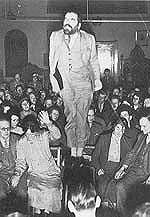 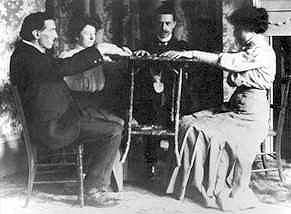 |
What have been the results when persons allegedly able to show ESP ability are tested under valid scientific controls? We'll look into that in another fact sheet. Almost invariably the test simply involves target guessing— the subject in the test is supposed to describe a playing card, or a painting, or a distant location that he or she cannot directly observe. More seldom, the subject is supposed to produce by concentration an actual physical effect... to cause one face of a die to come up more often than usual, to cause a ball to bounce away from its most probable path, etc. It's worth repeating an observation made by Prof. Henri Broch, namely that all such lab ESP seems to be vanishing with time. In the 1870s, great psychics could levitate kitchen tables or even themselves; by the 1970s great psychics could only bend spoons and keys. A few years later they could barely deflect almost weightless compass needles or tiny pieces of paper. Similarly in J. B. Rhine's card-guessing ESP experiments of the 1930s, results were claimed of up to 10% above chance. By the 1950s, alleged positive results tended to be less than 1% above chance. And by the 1990s, alleged positive results tended to be above chance by a millionth of a percent, or less! Are experiments getting better? Or are naive experimenters very gradually, very slowly, but surely wising up? |
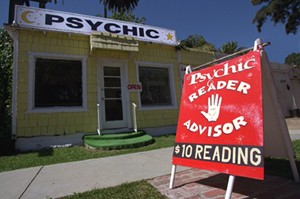 |
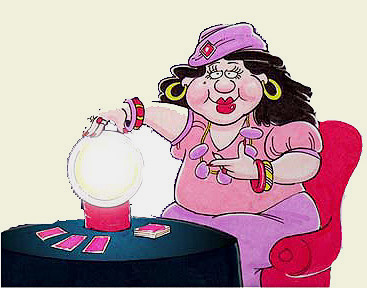 |
Since ESP experiments almost invariably involve nothing more than “target guessing,” gambling expert John Scarne pointed out that it is never necessary to do such experiments... instead, the parapsychologists should just examine the records of gambling casinos. Here, huge numbers of “runs” are carried out daily; the subjects have the best possible incentive to display their paranormal powers; and, there are excellent, continual and effective precautions against all known forms of cheating. Yet, as Scarne noted, the records of such casinos show no evidence whatsoever of ESP or any other paranormal abilities. The profits of the casinos depend crucially on results being, over the very long run, in precise correspondence with chance expectations, and the casinos' profits indeed come in precisely as forecast mathematically on the assumption that ESP does not exist.
In an interesting book, LEAPS OF FAITH, British psychologist Nicholas Humphrey makes another devastating point which is seldom appreciated and worth quoting at some length. “Compare the following two hypothetical situations. In the first, a parapsychologist holds up a card with some letters written on the back of it, and asks you to try to say what they are. This is a test of ESP. In the second, an optometrist holds up a card with some letters written on the front of it, getting smaller and smaller, and likewise asks you to say what they are. This is merely an eye test. The two tests are obviously quite similar. But they have been undertaken with different ends in view, and have been given different names.” Why shouldn't ESP work as well or better for the letters we can't quite make out since they are too small for our eyesight, compared to the letters we can't see at all, and thus result in us getting a wrong glasses prescription? In fact, the eye test, practically speaking, always results in a correct eyeglasses prescription. Dennett goes on to remark, “Now it is true that this eye test is a relatively informal procedure, and it might be argued that a small amount of ESP would actually go undetected by the optometrist. But the fact is that just such tests of the limits of people's normal powers of perception have been run again and again in conventional psychological laboratories, using methods that would be exquisitely sensitive to any kind of information transfer. This is precisely how psychologists measure such things as visual acuity, hearing thresholds, discriminative ability, and so on. And in literally thousands of experiments they have established that there really are sensory stimuli that people cannot see, cannot hear, cannot feel, cannot smell, cannot discriminate, cannot recognize, even when these stimuli are physically distinct and known [unambiguously] to another person. In these thousands of experiments they have therefore incidentally, but nonetheless conclusively, shown that ESP does not occur.”
 |
In practice, in the early 21st Century, ESP has devolved into just one more lifestyle-theme for sale to those who lack the ability to think critically about themselves. There are many popular courses, available on line or in person, which claim to develop your psychic abilities in “astral projection,” or in “remote viewing.” The only thing required to learn “astral projection” or to have “out of body experiences” is the willingness to reinterpret ordinary dreams as examples of such supernatural feats. After spending good money for the course, if you have a vivid dream about Paris, why, it means you were “actually, spiritually” there, so that money was well spent, right? Similarly, after your “remote viewing” class, you can sit in a windowless room and “describe” whatever pops into your mind, make simple sketches, etc., and validate these random thoughts and images as features of a distant outdoor location— a building under construction, a city park, etc.— which you have been told nothing about. Having spent your hard-earned money on the course, it might not occur to you that any outdoor location involves millions of shapes, colors, textures and patterns, so that anything whatsoever that you come up with can be “matched” to something somewhere at that location... or any other location. Why bother to learn remote viewing, however, when you can astrally project or astrally travel to the actual location, or have an “out-of-body experience,” and see it as if you were really there, plus get a good night's sleep into the bargain? Such questions do not seem to arise in the minds of believers, who happily flit from course to course, learning all sorts of indistinguishable and indemonstrable “skills” that seemingly make them feel very, very special. |
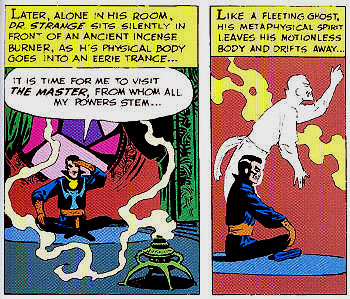 |
This material was originally written by Profs. Dennis McFadden and Rory Coker of the University of Texas. Additional contributions in an intermediate version were made by John A. Thomas, and some have been preserved here. These fact sheets were originally created for distribution by the International Cultic Studies Association.
Links: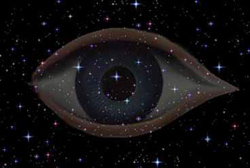 |
 |
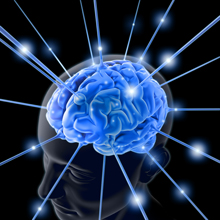 |
